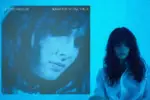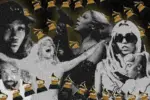Taylor Swift has had a successful musical career over the last 14 years, since the release of her first self-titled album in 2006. By dropping a new album consistently every two to three years, she built up a strong fan-base, and it’s pretty easy to see why.
Looking back at Swift’s old work, she clearly has a talent for songwriting. Her discography includes songs that range from catchy to tear-jerking, and she has the ability to convert everyday experiences into beautiful lyrics. This past July, Swift surprised her fans by suddenly announcing that she had a new album coming out that very same day at midnight.
The “Folklore” album was an instant hit, and it had a completely different tone from Swift’s previous seven albums. A lot of the songs were slow-paced, moody and introspective. Each song conveyed a distinct feeling while still combining to create a cohesive album; “invisible string,” for example, is an enchanting love song, and “seven” reminisces on childhood nostalgia. Similarly, the song “epiphany” compares healthcare workers in the midst of the ongoing COVID-19 pandemic to soldiers in combat.
One of the most intriguing elements of “Folklore” was the storytelling aspect that Swift managed to weave throughout the tracks. With a lack of pronouns on much of the album, listeners are able to immerse themselves in the tracks, and they get to decide for themselves the story written in the song. With other tracks like “cardigan,” “betty” and “august,” Swift developed an entire teenage love triangle.
Just five short months later, Swift dropped a second surprise album titled “Evermore.” It’s the sister record of “Folklore,” and it’s filled with all of the songs that Swift couldn’t stop writing once she released the first album in July. In a tweet about songwriting, she wrote, “I loved the escapism I found in these imaginary/not imaginary tales. I loved the ways you welcomed the dreamscapes and tragedies and epic tales of love lost and found into your lives. So I just kept writing them.”
As the sister album to “Folklore,” “Evermore” was expected to be filled with just as many whimsical emotions, beautiful poetry and expert storytelling as the first record. Swift really pulled through. Not only does “Evermore” stack up to the record that came before it, but it surpasses “Folklore” in terms of the depth and experimentation present in the stories Swift tells through her songs.
In “Evermore,” Swift explores the intricacies of human relationships. Through her lyrics, she examines how they form, how they bend and how they completely fall apart.
In “Champagne Problems,” Swift tells the story of one person who’s ready to commit to forever in a relationship, and one person who’s ready to completely let go. She sings, “I never was ready so I watched you go, sometimes you just don’t know the answer, ‘til someone’s on their knees and asks you.”
“Cowboy Like Me” describes two con artists who fall in love with one another with pessimistic lyrics like, “Forever is the sweetest con.”
Swift delves into the difficulties of marriage in some of the tracks on “Evermore.” The song “Ivy” is a sweet-sounding romantic song, and it includes lyrics such as, “My pain fits in the palm of your freezing hand.” However, the lyric is shortly followed by the lines, “Taking mine, but it’s been promised to another,” indicating that the romance listeners are rooting for revolves around an affair.
“No Body, No Crime,” a track reminiscent of songs recorded by country stars like Carrie Underwood, also delves into the topic of infidelity, but the song also includes murder and revenge.
The fact that so many of the tracks on “Evermore” and “Folklore” are rooted in the escapism found in fictional stories, instead of being based on Swift’s own life, makes both releases stand out from the singer-songwriter’s previous albums. Her first few records are so personal and raw they’re almost like taking a peek into someone’s personal diary. With her new albums, it’s clear that Swift fully threw herself into developing compelling storylines and characters throughout her songs.
However, while each song on “Evermore” seems to tell a different tale, they’re tied together by common themes and motifs. As mentioned above, Swift brings up marriage and relationships in a number of the tracks. Listening to the album as a whole, there are other thematic elements that are repeated throughout the songs. For example, Swift continuously makes references to oceans and shipwrecks in “Evermore.”
In “Willow,” which is the opening track on the album, the first lyrics are, “I’m like the water when your ship rolled in that night.” In the same song, Swift also sings, “Lost in your current like a priceless wine,” insinuating that the wine bottle was lost in a shipwreck. In the closing track on the album, which is also titled, “Evermore,” Swift harmonizes with the band Bon Iver and sings, “And when I was shipwrecked, I thought of you.”
The meaning of the repeated references to oceans and shipwrecks throughout “Evermore” is ultimately up to the listener. Whether they’d like to analyze each song lyric to uncover hidden themes in Swift’s work, or simply enjoy her angelic voice and lyrics is up to them. However, it’s still worth noting how these tiny details add to the intricacies of “Evermore.” The small additions make “Evermore” an album that deserves to be dissected and learned from.
Now, not only does Swift have the masterpiece album “Folklore” under her belt, but she has also added “Evermore” to her discography as well. With how wonderful, exciting and experimental both of her 2020 albums are, it should be exciting to see what Swift does next with her music career. Whether she sticks to dropping surprise albums every six months or goes back to a more spread-out release schedule, her songs are sure to still have the enchanting quality she manages to recreate on every new album.
















